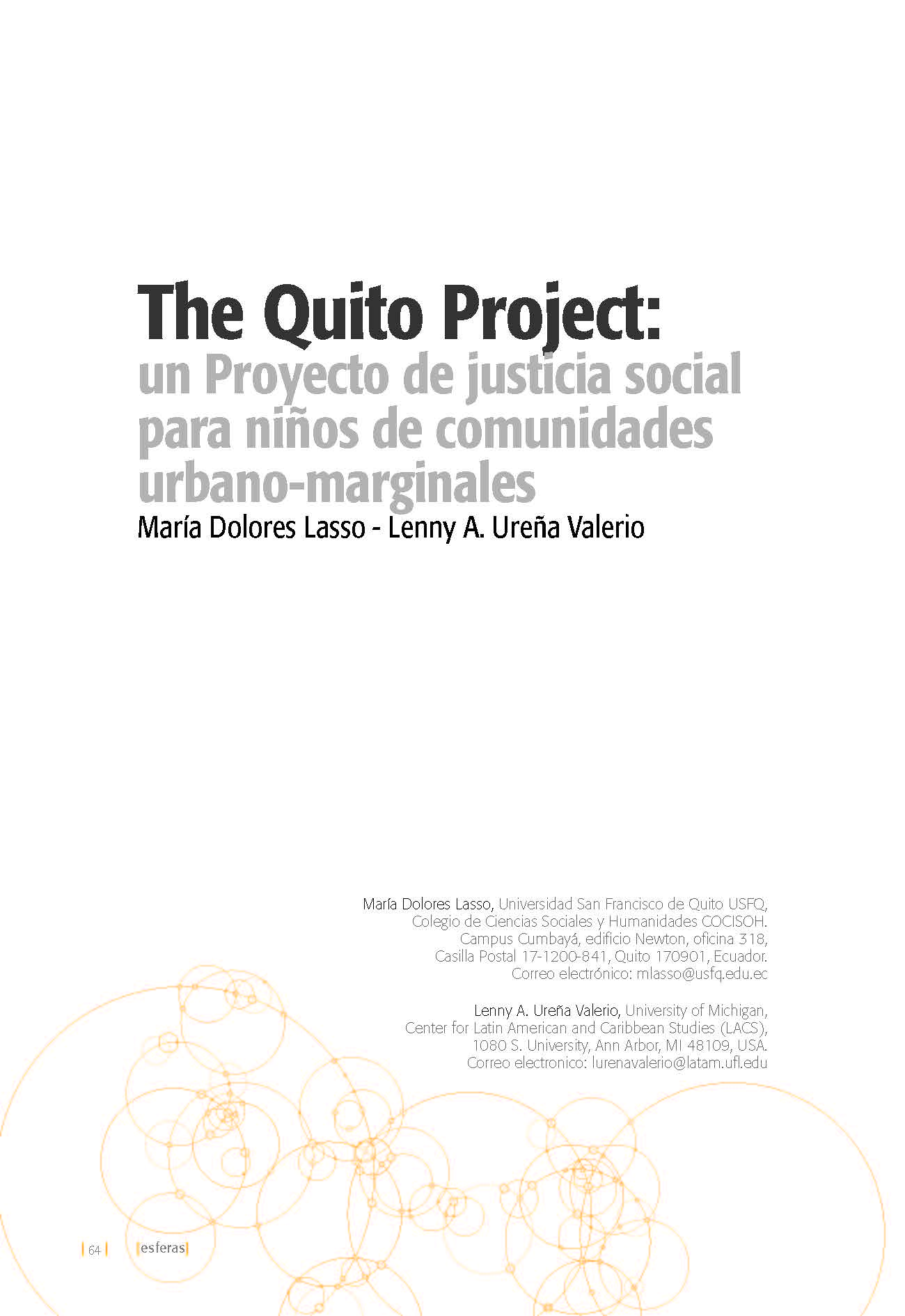ODS 4 Educación de Calidad

Publicado 2022-08-30
Palabras clave
- Educación,
- niños,
- campamento de verano,
- voluntariado,
- urbanomarginales
- justicia social ...Más
Cómo citar
Lasso, M. D., & Ureña Valerio, L. A. (2022). The Quito Project: un Proyecto de justicia social para niños de comunidades urbano-marginales. Esferas, 1. https://doi.org/10.18272/esferas.v1i.2804
Resumen
Desde el año 2013, estudiantes voluntarios de la Universidad de Michigan y de la Universidad San Francisco de Quito han colaborado en un proyecto de justicia social para atender a niños de barrios urbano-marginales de Quito durante el período vacacional de verano. Estos estudiantes, con el acompañamiento de una profesora de cada institución, organizan un campamento de verano que permite a niños de escasos recursos acceder a actividades académicas y recreativas que fomentan su desarrollo integral.
Descargas
Los datos de descargas todavía no están disponibles.
Citas
- Berk, L. E. (2014). Child Development. Boston, MA: Pearson.
- Blommaert, J. (2005). Discourse: Key Topics in Sociolinguistics. New York, NY: Cambridge University Press.
- Boulay, M. (2016). Summer Matter: 10 Things Every Parent, Teacher, and Principal Should Know about June, July, August. North Charleston, SC: CreateSpace Independent Publishing Platform. Disponible en http://ecoed.wikispaces.com/file/view/Revolutionizing_Education__Youth_Participatory_Action_Research__Critical_Youth_Studies_.pdf
- Cochran-Smith, M. y Zeichner, K. M. (2013). Studying Teacher Education. New York, NY: Routledge.
- Crabtree, R. D. (2013). The Intended and Unintended Consequences of International Service Learning. Journal of Higher Education Outreach and Engagement 12 (7), 43-67.
- Doerr, M. y Marshall, J. D. (2004). A Contemporary Praxis of Collaboration. En R. A Gaztambide-Fernández y J. T. Sears (eds.), Curriculum Work As A Public Moral Enterprise (pp. 109-118). Lanham, MD: Rowman & Littlefield Publishers.
- Finley, S. y Adams, J. (2004). Taking Teachers to the Street. En R. A Gaztambide-Fernández y J.T. Sears (eds.), Curriculum Work as a Public Moral Enterprise (pp. 85-95). Lanham, MD: Rowman y Littlefield Publishers.
- Grusky, S. (February 1, 2000). International Service Learning: A Critical Guide from an Impassioned Advocate. American Behavioral Scientist 43 (5), 858-867.
- Kiely, R. A. (2005).Transformative Learning Model for Service-Learning: A Longitudinal Case Study. Michigan Journal of Community Service Learning 12 (1), 5-22.
- Morrell, E. (2008). Six Summers of YPAR: Learning, Action, and Change in Urban Education. En J. Cammarota y M. Fine (eds.), Revolutionizing Education: Youth Participatory Action Research in Motion (pp.155-184). Oxon, UK: Routledge.
- Ramson, A. J. (2014). Service-Learning: A Tool to Develop Employment Competencies for College Students. Journal on Excellence in College Teaching, 25 (1), 159-187.
- Thomas, L. y Beauchamp, C. (2009). Understanding Teacher Identity: An Overview of Issues in the Literature and Implications for Teacher Education. Cambridge Journal of Education, 39 (2), 175-189.
